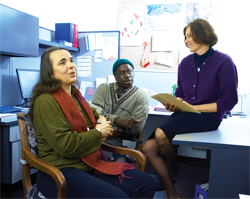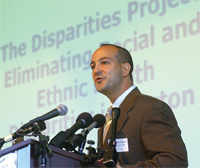Quality Care for All
Unequal Treatment: Confronting Racial and Ethnic Disparities in Health Care, a landmark 2002 study from the Institute of Medicine, found that racial and ethnic minorities receive lower quality of care than non-minorities, despite insurance status and socio-economic factors. How can we make sure that all Massachusetts residents – regardless of race or ethnicity – receive the best possible care?

Clinical leaders and patient advocates at the Cape Cod Free Clinic and Community Health Center
review a grant from the Blue Cross Blue Shield of Massachusetts Foundation designed to help
eliminate health care disparities on Cape Cod.
The Unequal Treatment report concludes that many racial and ethnic groups face significant barriers to quality care and, as a result, suffer higher incidences of disease and mortality rates. In Massachusetts, for example, African-American babies are twice as likely to die during the first year of life as white babies.6 Half of African-American and Latino children born after 2000 are likely to develop type 2 diabetes.7
At Blue Cross Blue Shield of Massachusetts, we recognize that working to eliminate racial and ethnic health care disparities is an essential part of keeping our promise "To Always Put Our Members' Health First." That is why we are supporting Mayor Thomas M. Menino's initiative for Boston, The Blueprint to Eliminate Disparities. CEOs from all teaching hospitals in Boston, leaders from community groups, and health plans are working together to execute The Blueprint, which has been recognized by the U.S. Department of Health and Human Services as a model for other cities.
In addition, in 2005, the Blue Cross Blue Shield of Massachusetts Foundation committed $3 million in three-year grants to ten different organizations across the Commonwealth. The grants will enable health care organizations to develop programs that will reduce—and hopefully eliminate—disparities in health care based on race and ethnicity. One grant, for example, will enable the Cape Cod Free Clinic and Community Health Center in Falmouth to support diabetes clinics in a variety of venues on the Cape. The clinics will provide comprehensive care and services for black, Brazilian, Latino, and Native American residents with untreated or poorly controlled diabetes.
Working collaboratively with others, we believe it is possible to eliminate racial and ethnic disparities in care by:
- Educating clinicians so they are better able to provide culturally competent care to diverse populations
- Expanding access to high-quality care
- Promoting culturally and linguistically competent patient health education
 Dr. Joseph R. Betancourt, Director, The Disparities Solutions
Center, Massachusetts General Hospital; Assistant Professor of Medicine, Harvard Medical School:
"The unwavering commitment of Blue Cross Blue Shield of Massachusetts and the Foundation, combined
with their collaborative efforts across the state to eliminate racial and ethnic disparities, will improve
the health of all residents of the Commonwealth."
Dr. Joseph R. Betancourt, Director, The Disparities Solutions
Center, Massachusetts General Hospital; Assistant Professor of Medicine, Harvard Medical School:
"The unwavering commitment of Blue Cross Blue Shield of Massachusetts and the Foundation, combined
with their collaborative efforts across the state to eliminate racial and ethnic disparities, will improve
the health of all residents of the Commonwealth."
Our collaborative efforts to end disparities in health care will improve the care our members receive as well as the care all residents of the Commonwealth receive, regardless of race or ethnicity.
6 Boston Public Health Commission, "The Disparities Project Data Report," A Presentation and Analysis of Disparities in Boston, June 2005: 22.
7 The Centers for Disease Control and Prevention, CDC Issues Diabetes Warning for Children, June 2003.
